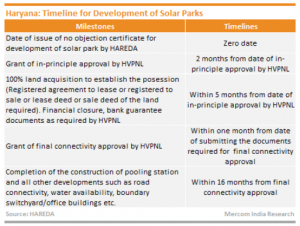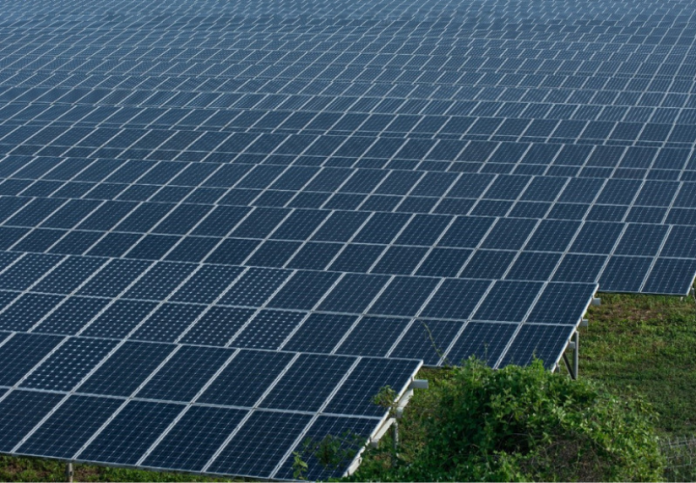The New and Renewable Energy Department, Haryana, has issued guidelines for developing solar parks in the state by private entrepreneurs without central financial assistance.
The solar park developers are required to submit their proposals to the Haryana Renewable Energy Development Agency (HAREDA) along with the detailed project report and all relevant land documents. After examining the detailed project report (DPR), a no-objection certificate for the solar park will be issued.
Once the Agency gives a nod to the program, the developer may apply for the feasibility of connecting to the Haryana Vidyut Prasaran Nigam Limited (HVPNL).
The minimum capacity of such a solar park should be 50 MW. The solar park developer should also submit the agreement to lease or the sale of a minimum of 100% of the required land along with the application.
The minimum land required for the solar parks has been set as 4 acres/MW, and the cost of development of a 50 MW solar park will be considered as ?100 million ($136,500). The development of the solar park should be completed within 24 months from the issuance of the no-objection certificate for the solar park’s development.
The timeline for the solar parks is given below:
 For the development of solar parks, the financial closure may be defined as the arrangement of 90% of the total project cost either by internal resources or through tie-ups with banks or lending institutions.
For the development of solar parks, the financial closure may be defined as the arrangement of 90% of the total project cost either by internal resources or through tie-ups with banks or lending institutions.
After the approval from HVPNL, the solar park developer should submit a document related to financial closure, bank guarantee, and land lease deed or sale deed within five months for final connectivity.
The developer should issue a tender for the internal infrastructure of the solar park within four months of the issuance of final connectivity by HVPNL, or else the approval for the solar park will be canceled. If the park is not completed within 16 months from the final connectivity approval of HVPNL, the approval may be canceled, and the allotted grid connectivity may be given to another developer. However, for already approved solar parks, the period of 16 months will be counted from the date of the issuance of these guidelines or the approval of HVPNL, whichever is later.
The solar park developer will be responsible for creating pooling stations and an internal transmission network on behalf of the solar project developers. The pooling station will be connected with the state transmission utility. Some of the responsibilities of the solar park developer include acquisition of land, getting land clearances, developing pooling stations, developing internal electrical transmission systems, making arrangements to connect to the grid, and providing basic drainage and water supply, among others.
The state distribution companies will not be obliged to purchase power from the solar park projects. It has also been clarified that the developers will not receive any central financial assistance for setting up the park.
The solar park will not be transferred up to one year from the commissioning date, with a minimum of 75% of the total capacity of the solar park being commissioned. The solar park developer should provide plug-and-play facilities to the solar project developers for setting up solar projects in the park. The solar park developer should not have any equity shareholding in any of the solar projects to be developed.
Also, the solar park developer may allot any capacity to the solar project developers with a minimum of 3.5 acres/MW of land. However, if any project developer intends to develop the venture in the solar park in less than 3.5 acres/MW, he will have to provide the technical details, which HAREDA will evaluate.
The solar park developer should have a minimum of two solar project developers in the park, and there will be no maximum cap on the number of project developers in the park. The solar project developer will not require separate connectivity approval from HVPNL for the projects and will use the pooling station of the park to evacuate the solar power through the common pooling station.
However, after the issuance of the final connectivity by HVPNL, registration of the solar projects with HAREDA will be mandatory, and after that with HVPNL for the grant of long-term open access agreement and the signing of commissioning agreement on commissioning of the project.
Recently, the New and Renewable Energy Department, Haryana, issued the draft ‘Haryana Solar Power Policy, 2021’ and requested government stakeholders to send their comments within 15 days from the date of the notification. The draft mentions that the state must focus mainly on rooftop solar projects and small-scale distributed solar systems besides exploring the potential of megawatt-scale solar projects and parks.
In June last year, the Ministry of New and Renewable Energy had modified its guidelines for developing solar parks and ultra-mega solar power projects. The program was initiated in December 2014 to facilitate solar project developers to set up projects through a plug-and-play model.
Subscribe to Mercom’s real-time Regulatory Updates to ensure you don’t miss any critical updates from the renewable industry.
Haryana Issues Guidelines for Solar Parks by Private Developers
The minimum capacity of such a solar park should be 50 MW
Source:MERCOM






